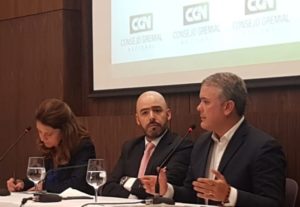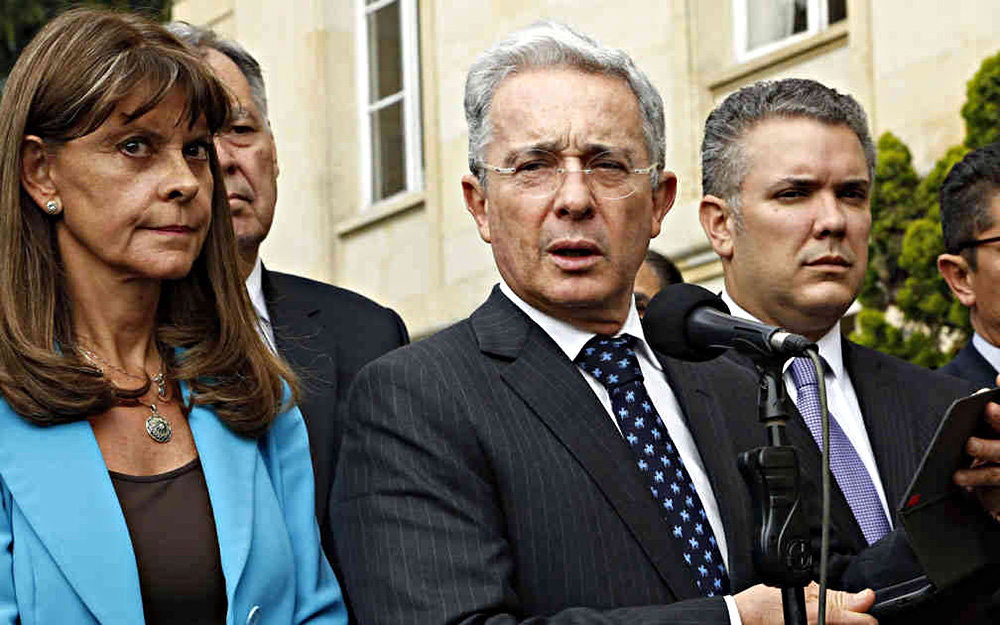If the return of Uribismo tells us anything, it’s that the ruling elite can adapt to the winds of change
By Kevin Howlett
You can’t beat Uribe. So, you join him.
That’s what Colombia’s ever-pragmatic political class has done. So too have evangelicals, homophobic fringe politicians, and religious fundamentalists. Alvaro Uribe has won every election since 2002, except the one in 2014, which he lost, in part, to one of the biggest voter fraud operations in history.
Uribe has been Colombia’s most popular politician for a generation. The country’s elite know they cannot beat him at the polls, so they must accommodate him. They did it first eight years ago with President Juan Manuel Santos, and they’ve done it again this year with President-Elect Ivan Duque.
Colombia’s so-called “leaders” are living proof of Darwinism. It’s not the most intelligent that survive, but those most adaptable to change. And like a monarchy, the Colombian elite mutate with pragmatism, learning to adapt to the winds of change, not to be buffeted by them.
When Santos was elected in 2010 he was hailed as Uribe’s chosen one – a fiercely loyal and a hard-line defence minister. But Santos was put up to it by the ‘grey suits’. He was their man (from one of the most elite families in the country), a sort of Trojan horse through which the levers of power would be wrested from a worryingly despotic (in their view) Uribe.
At the end of the last century, after another failed attempt at forcing the FARC to exchange their bullets for ballots, Uribe was invited into the presidential palace, to do the dirty work, to turn the Plan Colombia money into a shock and awe military strategy and blow the guerrillas to smithereens. Those with a perspective of history will not miss the parallels with Gustavo Rojas Pinilla, to whom the governing class gave its blessing to take power in a military coup in 1953.
Related: Colombia ‘Choosing Between AIDS and Terminal Cancer’?
But after eight years as president, Uribe had become Dr. Frankenstein’s monster. It was time to take back control, and while Uribe could not be defeated in 2010, he could be played, by Santos, as Brutus. It took just a few months for Santos, once elected, to show his true colours, turning on his old boss, and beginning secret talks with the FARC’s top brass – a dialogue which eventually led to the Havana peace process.
The last eight years have been a psycho-drama. A Greek revenge play whose stage is the penumbra of Uribe, the ghost of a president past.
As the denouement of the Santos era approached, the ‘grey suits’ gathered again in the gentlemen’s clubs of Bogota to agree on German Vargas Lleras. His aristocratic lineage meant he had been prepped for the job since he was in short trousers. It was undoubtedly ‘his turn’.
Alas, it was not to be.
Uribe, having been betrayed by Santos, was not again to entrust his future to the Bogotano mafia. So he chose his own man. A younger and more charismatic candidate than the failed 2014 pick – the ageing and unkempt Oscar Ivan Zuluaga.

Ivan Duque, right, addresses a crowd of Colombian business leaders at an event held by the National Council of Industry Groups (Consejo Gremial Nacional, or CGN in Spanish) while on the campaign trail. Ten days before the run-off election, the powerful business association publically endorsed Duque for president.
But while Duque was hand-picked by Uribe, he is not really his man. He is what, given his position of power relative to the political elite, Uribe can get away with. Yes, the folksy Paisa is still the most popular politician of the time, but he is – after years of “political persecution” (as he sees it) of his corrupt former Cabinet members – loathed by nearly half the country.
The ravages of office have taken their toll. Uribe’s power has diminished over the last eight years, and an unfettered Uribe might not win. Duque is a compromise. A man the elite can do business with, a man around whom they can coalesce and build an alliance, or to whom they are content to be a client.
It’s not for nothing the elite have managed to stay in power for 200 years; they have survived two civil wars, outlived the world’s longest running Marxist revolutionary insurgency, and hobbled through the extreme violence of Pablo Escobar.
Colombia’s elite know how to play the long game.
Worried about “Uribismo 2.0”? You would do well to ignore the foreign journalists who panic about Duque being a fire-breathing right-winger. He is, on current evidence, no fervent Uribista de pura sangre. In fact, Duque is, and has always professed to be, like his father, a Liberal – except, of course, when he referred to Uribe as the “eternal president” – which he can be forgiven for. He was, after all, in campaign mode, and playing to the base.
Related: The Case for ‘Voto en Blanco’
It may surprise, but it shouldn’t, to learn, that less than a year ago, Duque was tipped as a member of a would-be Vargas Lleras Cabinet. It may also surprise you that five years ago, Duque was being courted by President Santos – the man who had sent him to Washington and the International Development Bank.
Yep, Duque pondered joining the Santos team. But he knew Santos’ time was soon up, that his was a legacy that would not last, nor a political capital that would pay off. So four years ago, Duque made his return to Colombia and entering Congress for the first time, at the behest and as a pupil of Uribe.
But nothing prepared him for what happened yesterday. Just five months ago, when Vargas Lleras was still expected to win, Duque was nowhere in the polls. Gustavo Petro found his voice, polarising the campaign, enthusing the kids and the lefties who’d never before had even a sniff of power. This played into Uribe’s, and therefore Duque’s hands. Vote Petro get Venezuela. That’s all Uribe had to say. And so, in March, with Vargas Lleras still at 8 percent in the polls, the elite abandoned their man and started moving votes for Duque.
But make no mistake – Ivan Duque has not won this election – Uribe has. In under two months, Duque will begin a four-year presidential term with 80 percent of Congress behind him – the U Party, the Conservatives, some of the Liberals, MIRA, and of course the Centro Democraticos. He will have control over the executive and the legislature and has promised to dismantle the judiciary, and in its place install a new Supreme Court, modelled on his erstwhile adopted home – the United States.
Duque is no Emmanuel Macron emerging through the middle, raising to the ground the edifices of traditional party politics. Duque is president because he is the elite’s way of keeping enough of a grip on power, while also understanding that Uribe – not yet, anyway – can be beaten.
How long will Uribe’s shadow be cast over Colombia’s main stage? Will Colombians have had enough by 2022 and two decades of election victories? The next four years will be Duque/Uribe/the political class vs. Gustavo Petro, the left-wing polemicist. If that doesn’t sound like an appealing prospect, remember that it could be far worse. Just look across Colombia’s eastern the border.
—
Kevin Howlett is a Colombia and UK based lobbyist, political commentator, and the founder of the Colombia Politics blog. To read more, visit www.colombia-politics.com.

Journalist. Misfit. Malcontent. Provocateur. Is a better Colombia is possible? We’re starting to have doubts.


Pingback:Colombia: The Next Domino to Fall in the ‘Latin Spring’? | MiKolombia.com